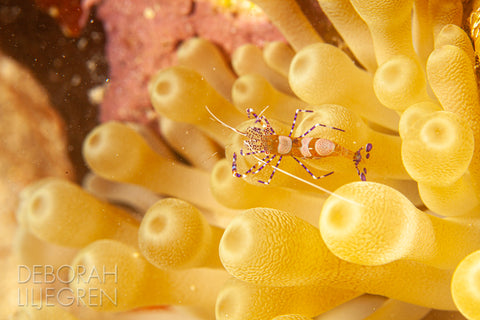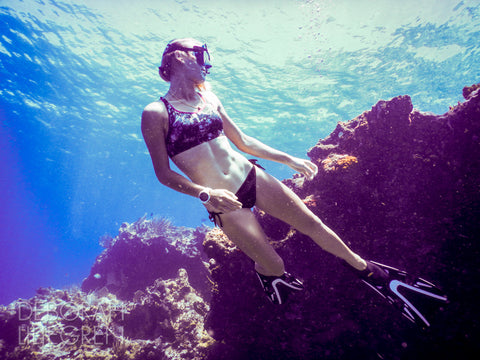I will be the first person to tell you that lugging around strobes isn't a picnic. I will also be the first person to tell you that you don't have to use them in order to make a wonderful photograph...depending upon the composition and environment.
I always have my strobes ready to fire, though I may not use them for a specific shot because strobe use is very shot dependent. Because I am in the water without lighting assistants, it means that I have to manage all lighting from my own rig, which is the fairly common. It also means that when I do use my strobes I have to consider backscatter.
For those of you new to underwater photography, backscatter is the reflection from all of those little things in the water that you may or may not see. Once the light from the firing strobe hits them, you get a plethora of speckles in your shot. See the image below of the shrimp and the anemone? All those little specks of white are the result of the backscatter. Normally I wouldn't show these images, but these are for illustrative purposes, not my normal quality. (Yes, I try to only show the good stuff!)

Even without firing your strobes, you can still get backscatter light depending upon the light's incidence/reflection angle relative to your lens. The photo of the freediver below shows how even without a strobe fire, you can still get significant interference in the image clarity.

There is a lot to consider when shooting underwater and why I suggest shooting a few times with your strobes or lights. Leave them on the boat and get in the water and think about the following:
-
The direction of light
Where is it coming from?
Is it reflecting too harshly? -
Aperture/F stop
Are you getting enough light?
Is your depth of field too shallow because it's cranked open? -
Composition
What are you trying to capture?
Is speed or depth of field more important here?
If you are shooting macro, turn on those strobes because you will want that tiny aperture and will need the light. For those wide angle shots, leave the lights off and play with the aperture a bit.
If you don't already shoot in Manual mode - on land or in sea - start doing so. It gives you greater technical and creative control. And it gets you more comfortable with knowing your camera as well as elevating your thought process about how to solve challenges and do so at depth.
Have questions? Feel free to reach out to me and I will happily help. Don't forget to check out Ikelite's website as they offer great tips and tricks on how to get great underwater shots.

